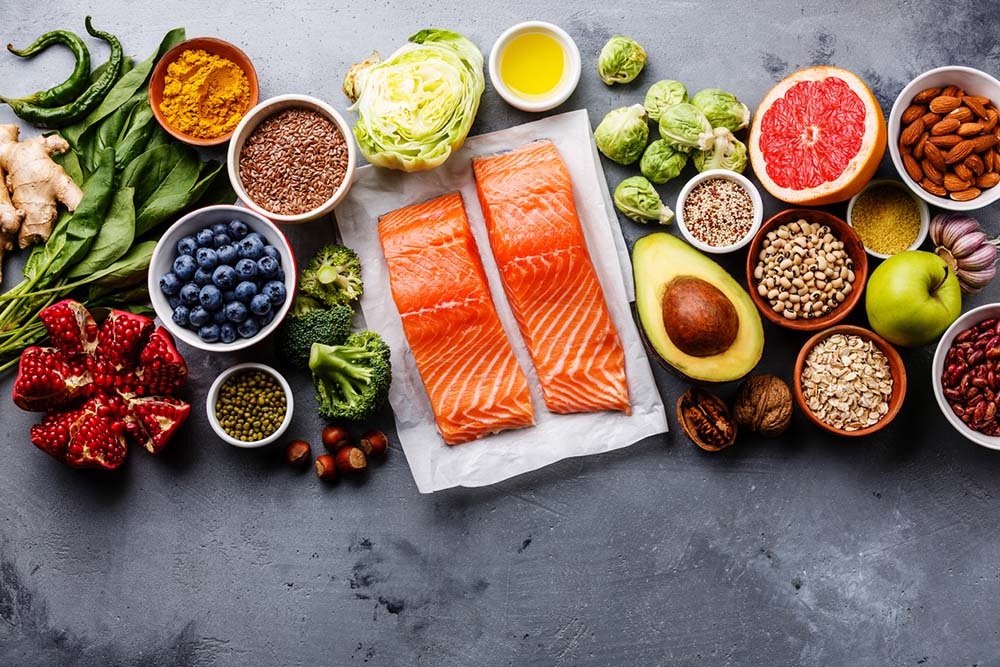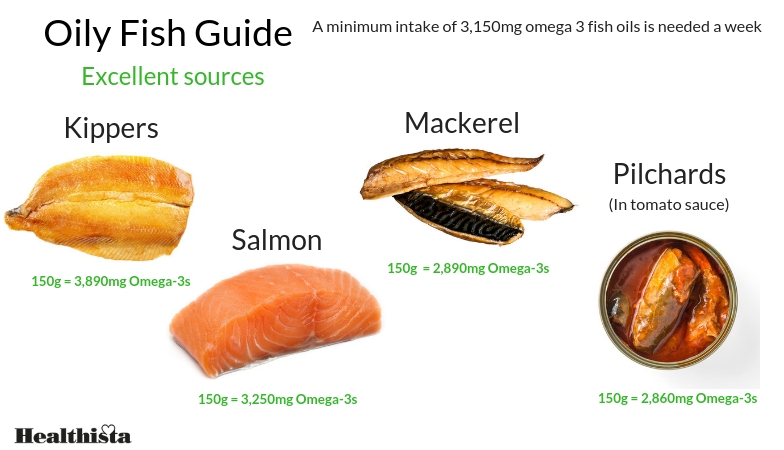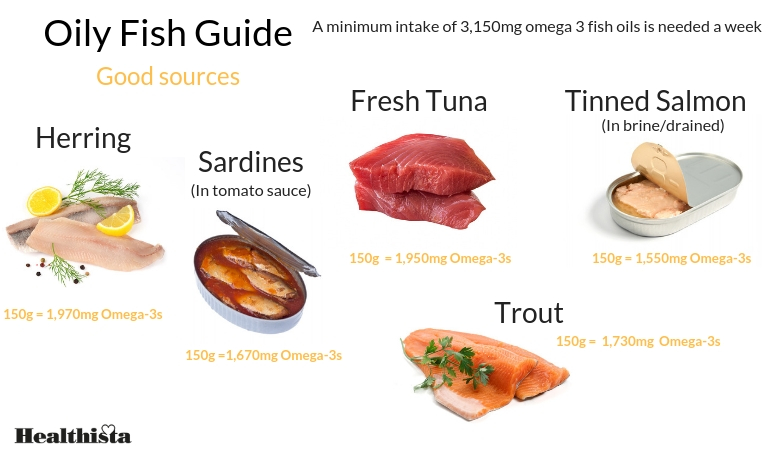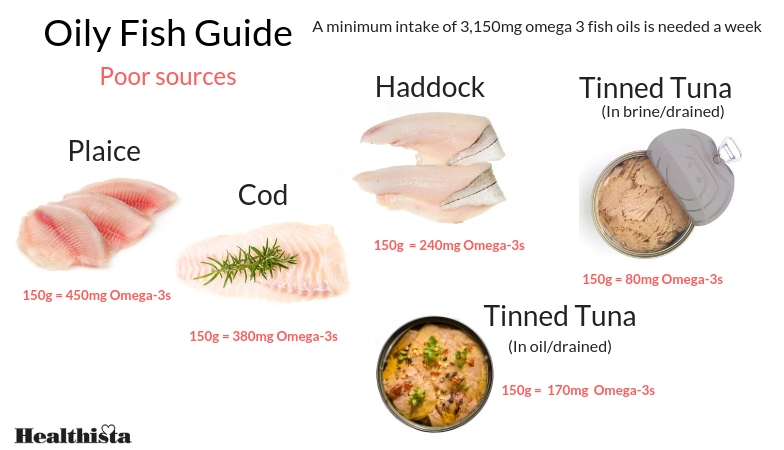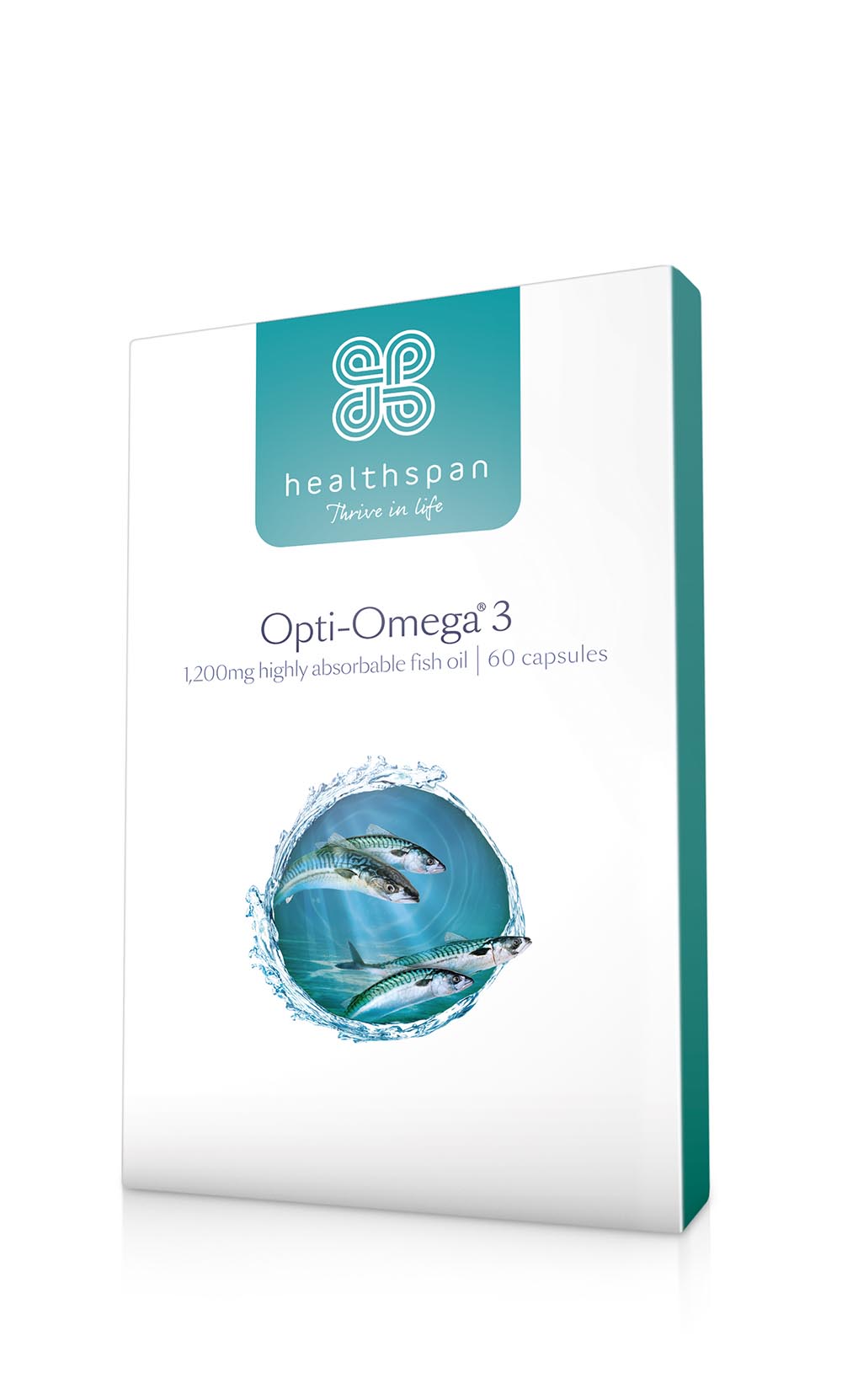What is omega 3 anyway, I hear you say? We all know we need omegas but few of us know which ones or even what they are! Here’s all you need to know, from editor Anna Magee
Omega 3 fatty acids must be the nutritional equivalent to Kim Kardashian in terms of the column inches they get.
Just last week it was reported in the prestigious journal The Lancet that taking omega-3 supplements with aspirin was associated with a reduction in pre-cancerous bowel polyps (a condition commonly associated with a higher risk of developing bowel cancer).
Only two days before that, ground-breaking research from The Cochrane Group analysed 70 randomised clinical studies looking at over 20,000 women and concluded that pregnant women that took omega-3 fatty acids had an 11 per cent lower chance of giving birth before 37 weeks and a staggering 42 per cent lower chance of giving birth before 34 weeks.
From helping reduce heart attacks to benefiting brain health and memory, the nutritional CV for omega-3 fatty acids keeps growing.
But recently, Healthista did a straw poll around the office and through our readers and we realised that despite their benefits being touted often in the media, no one really knew what omegas were, where exactly they could get them and why they needed them.
‘That’s fish oil, right?’ said one. ‘But if I don’t eat fish, what else can I eat to get them?’ said another. ‘What’s the difference between omega 3, 6 and 9?’ said someone else.
It was clear that – as with so many matters concerning health advice – there was a big knowledge gap when it comes to omegas.
That’s why we created this guide to answer all your questions.
Which omega is which?
Most of us have heard of omega-3 fatty acids, but we’re not all aware that there are other omega fatty acids such as -6, -7 and -9 that play different roles in our bodies.
‘Fatty acids are used to make cell membranes, sex hormones and regulate inflammation in the body, making them essential to your overall health and day-to-day functioning,’ says Medical Nutritionist and GP, Dr Sarah Brewer who is also the Medical Director of Healthspan.
So, let’s look at each one specifically.
OMEGA-3s – The ones you REALLY need
Omega 3 fatty acids are a type of polyunsaturated fat of which one, alpha-linolenic acid, or ALA, is deemed ‘essential’ because your body can’t make it – you have to get it from your diet.
You can make other omega-3s from the ‘parent’ ALA, but the process of converting this on to the longer chain omega-3s is not that efficient and easily blocked, so in practice other omega-3s are sometimes also referred to as essential.
There are three important types of omega-3 fatty acids:
Eicosapentaenic acid (EPA): Its main function is to reduce inflammation in the body which is associated with illnesses such as arthritis, asthma and eczema .EPA appears to be involved in learning, memory and mood.
Docosahexaenic acid (DHA): This makes up about 8% of our brain’s weight and is key to brain development and function. This is also crucial to maintenance of normal vision and brain development in babies and children.
Alpha-linolenic acid (ALA): This can be converted into EPA and DHA, but the process isn’t very efficient. It’s main function in the body is for energy.
Signs you need omega-3s
According to Dr Brewer, there may be physical signs you need omega-3s including the following:
Scaly shins
Dandruff
Brittle nails
Hair loss
Lifeless, strawlike hair
Joint pain (such as arthritis)
Fatigue
Foggy thinking / poor concentration
Disturbed sleep or insomnia
Painful periods
Breast tenderness and pain pre-period
Major benefits of omega-3s
Heart health – omega-3s can help increase good HDL cholesterol and reduce triglycerides in the blood, and has beneficial effects on blood pressure.
Brain health – Eating omega-3 rich oily fish is associated with a slower decline in brain function with age and lower risk of dementia.
Fighting inflammation – Omega-3 fats are anti-inflammatory, meaning they can reduce the inflammation that can contribute to a long list of diseases including arthritis, eczema and asthma.
Joint pain – ‘Omega 3 fish oils have a pain-killing effect like that of non-steroidal anti-inflammatory drugs,’ says Dr Brewer. ‘By reducing inflammation, they help reduce joint pain and swelling.’
Depression – People living in countries with the highest intakes of fish oil have the lowest rates of unhappiness and depression. The results from 21 studies, involving over 255,000 people found that those who ate the most fish and obtained the most DHA and EPA were 22 per cent less likely to develop depression than those who ate the least. The most effective intake was 1.8g omega-3 per day with improvements seen after just 21 days.
Anxiety – In one study, a group of healthy medical students took either omega-3 supplements (2.5 g per day) or placebo. Their blood was tested during low stress periods as well as on days before an exam, and those students who received omega-3 had a 20 per cent reduction in anxiety symptoms.
Menstrual pain ‘Painful periods seem to be worse in women who do not eat much fish, and taking omega-3 fish oil supplements has been shown to significantly improve painful periods in teenage girls,’ D’ Brewer points out. ‘This is because omega-3 essential fatty acids have a beneficial effect on the types of prostaglandins produced in the womb lining (endometrium).
Painful periods seem to be worse in women who do not eat much fish
Menopausal symptoms -‘The Truth About The Menopause on BBC One with Mariella Frostrup highlighted two interesting Canadian studies on how supplements of omega-3 fatty acid eicosapentaenoic acid (EPA) may reduce the symptoms of hot flushes and depression. Lead author Michel Lucas said in the American Journal of Clinical Nutrition, “Because EPA and DHA supplements have beneficial outcomes in cardiovascular disease, have no serious side effects and might be helpful in reducing hot flushes, research should be encouraged in middle-aged women with PD (psychological distress) and depression symptoms.”
Pregnancy DHA is vital for the development of normal brain and eye function, especially in the final trimester, says Dr Brewer. ‘A diet providing too few essential fatty acids during pregnancy may be inked with an increased risk of the offspring developing dyslexia, ADHD, autism spectrum and possibly schizophrenia,’ she says.
Where can I get my omega-3s?
The most important forms of omega-3 fatty acids are found in oily fish such as salmon, herring and mackerel, grass-fed meat and dairy, omega-3 enriched eggs or those from grass-fed hens as well as game meats such as buffalo and venison.
That’s not a great picture if you’re vegan, we grant you. ‘The vegan source of omega 3 is in the form of ALA found in plants,’ says leading nutritionist Robert Hobson. ‘Sources include walnuts, quinoa, leafy greens, soy foods, chia seeds and oils, flaxseeds and oils, squash and beans.
‘But the problem with these sources of omega-3 is they need to be converted in the body to the more usable forms of EPA and DHA, but this conversion is very poor meaning little ends up being converted,’ Hobson asserts.
‘For this reason, vegans may want to consider taking a vegan friendly omega 3 where the oil is sourced from sea algae.’
What about pollutants such as mercury found in fish?
‘Mercury is only really a factor if you’re eating a lot of oily fish,’ says Hobson. ‘The NHS recommends not eating more than four portions a week, but most people aren’t even eating one.’
Along with buying fish from sustainable sources (listed here), the NHS also recommends women who are planning a pregnancy, are pregnant or breastfeeding should eat no more than two portions of oily fish a week because contaminants in it such as mercury may affect the future development of a baby in the womb.
Likewise, they recommend this group avoid eating swordfish, shark or marlin and the rest of us eat these fish only once a week because they contain more mercury than other fish.
How much omega-3 do I need?
There is no standard set for how much omega-3 you should get each day, says Dr Brewer. The recommended intake of DHA and EPA in the UK are 450mg per day. The NHS recommends we all have two 140 gram portions of fish a week, with one of those being oily fish such as salmon, mackerel or herring (see above).
Organisations such as the World Health Organisation recommend getting a daily minimum of 250-500 mg EPA and DHA combined.
As less than one in five Brits get the recommended portions of oily fish, Dr Brewer recommends having a daily supplement of 500mg omega-3 which combine EPA and DHA – the amount provided by two 140 gram portions of oily fish a week. Try Healthspan Super Strength Omega 3, Sustainably sourced, 240mg DHA and 360mg EPA, 60 capsules £7.99.
If you are a fish eater here are some visual guides on getting your omega-3 quota in each week:
How should I supplement?
If you eat no fish, your supplement needs to provide at least 450mg EPA/DHA per day for general health, 1g per day for heart health benefits, and 3g or more per day if your painful joints have not responded to a lower dose, Dr Brewer recommends. ‘If you eat no fish, I would advise that you invest in a super strength or premium product – if you dislike the taste of fish, then a pure, low reflux premium oil is the best option,’ she suggests. Try Healthspan Opti-Omega 3, which is double-distilled using Healthspan’s patented filter-pure technology which removes harmful toxins, such as heavy metals and dioxins and is also popular with people as it is odour-neutralised to reduce reflux.
If you prefer a vegetarian/vegan source, or are allergic to fish ‘The most effective vegetarian sources are therefore omega-3 supplements made from marine algae extracts,’ says Dr Brewer. Try Healthspan’s Veg Omega 3, non-GMO, Sustainable and derived from natural algae which is rich in vegetarian and vegan omega 3 fatty acids DHA (330mg) and EPA (200mg) 30 capsules £8.95)
If you have difficulty swallowing capsules, then chewable fish oil capsules (designed for kids) and liquid omega-3 fish oils flavoured with citrus oils are available.
OMEGA-6s – The one you probably don’t need
The bottom line, omega 6 fatty acids are also important for human health, with one, linoleic acid, deemed essential, but our modern diets tend to contain too many.
Most of us have little problem getting enough omega-6 fatty acids as they are found in the sunflower and safflower oils used in manufacturing processed foods, says Dr Brewer.
Even if you eat a highly unprocessed diet, you probably still get enough omega-6 as they are also found in wholegrain breads, nuts, seeds, poultry, cereals and other vegetables oils such as hemp, corn and flaxseed oils.
‘While omega-3 fish oils can help reduce joint pain and inflammation (see below), omega 6 oils are converted into substances called eicosanoids that promote inflammation which can make conditions such as joint pain, asthma and eczema worse,’ Dr Brewer points out
There is one omega 6 essential fatty acid that can have an anti-inflammatory effect, Dr Brewer points out. This is gamma-linoleic acid or GLA, an omega 6 which does not feature highly in most people’s diets as it is mainly found in evening primrose, starflower and borage oils (hardly diet staples in the UK!). ‘Evening primrose oil is a supplement I take every day for skin health – I wouldn’t be without it,’ she adds.
‘Hemp oil is the richest source of GLA,’ says Robert Hobson. ‘It’s best drizzled over foods and made into dressings or added to smothies as cooking with it is inefficient as it burns quite easily.’
‘Although we can make some GLA ourselves, the metabolic reactions involved are affected by drinking alcohol, excess animal fats, crash dieting and exposure to pollution,’ says Dr Brewer.
One study showed that taking a high dose of GLA supplement significantly reduced a number of symptoms associated with rheumatoid arthritis.
Meanwhile, another form of omega-6 that may have some health benefits for weight management is Conjugated Linoleic Acid or CLA.
In fact, one large study found that taking 3.2 grams of CLA supplements per day effectively reduced body fat mass in humans. CLA is found in grass fed beef, full fat dairy and butter (vegans are not doing well here are they?).
OMEGA-7s – the dryness fix
Omega-7 fatty acids are unsaturated fatty acids found in certain fish, like salmon and anchovy, and oils such as olive oil, macadamia oil, avocado oil and sea buckthorn oil.
The omega-7 fatty acid, palmitoleic acid, is an important building block for healthy skin
Palmitoleic acid is one of the most common omega-7s and may lower inflammation in the body.
Dr Brewer points out. ‘ Sea buckthorn oil supplements can improve hair and skin quality as well as reducing any tendency towards dryness throughout the body, such as eczema, dry eyes, dry hair and female intimate dryness. It is especially helpful for women around the time of menopause, but can be taken by men, too, for its beneficial effects on the heart and circulation – it also contains natural plant sterols that lower cholesterol.’
Dr Brewer continues. ‘The omega-7 fatty acid, palmitoleic acid, is an important building block for healthy skin and mucous membranes, and helps to promote skin quality, boost wound healing and reduce dryness and itching.’
Signs of omega-7 deficiency include:
- Dry or red eyes
- Dry mouth
- Lack of vaginal lubrication
Sea Buckthorn Oil contains especially high levels of omega 7s and has benefits for mucous membranes in the body. It’s been shown to alleviate omega 7 deficiency symptoms such as dry eyes and vaginal dryness and has been used in traditional Chinese medicine over the centuries.
Try Healthspan Sea Buckthorn Oil which contains added vitamin A, which helps maintain the condition of skin and mucous membranes. ‘That means it helps support the skin tissue that protects and lubricates the nose, eyelids and internal organs, like the genito-urinary tract,’ Dr Brewer points out.
OMEGA 9s – the ones your body can produce
Unlike the 3s and 6s, omega 9s are not considered essential fatty acids because our bodies can make omega-9s and are used by the body when the omega-3 and omega-6 fatty acids are not present.
They’re found primarily in olive oil, avocados, almonds, macadamia nuts, pecans, hazelnuts, pecans and cashews.
if you don’t get enough of your other omegas, the body will eventually suffer from having a large amount of omega-9s
Omega-9s, also known as Monounsaturated Fatty Acids or MUFAs have a positive health effect on the lowering of cholesterol levels, reducing of insulin resistance, and boosting the immune system.
But it really is the balance that matters as you can get too much of a good thing – if you don’t get enough of your other omegas, the body will eventually suffer from having a large amount of omega-9s, if there is lack of the proper amount of omega-3s.
To take a balanced omega supplement Try Healthspan Omega 7 Sea Buckthorn Oil, with Vitamin A. 60 capsules £16.95 www.healthspan.co.uk
What about fish oil supplements? Will they give me what I need?
Fish oils are extracted from the flesh of oily fish such as salmon, herrings, sardines, pilchards and mackerel. ‘They are a rich source of both EPA and DHA which are derived from the micro-algae on which the fish feed,’ says Dr Brewer. ‘Typically, one gram of high-strength fish oil contains around 500mg of the important long-chain EPA and DHA (check label claims).
‘Select a pharmaceutical-grade omega-3 fish oil supplement made to GMP standards to ensure they are virtually free from marine pollutants,’ says Dr Brewer. ‘Those offered in the triglyceride (TG) form are most easily absorbed as they are in a ‘body-ready’ form’.
Cod liver oil
‘Cod liver oil comes from the flesh of white fish, such as cod, contains very little DHA or EPA.’ Says Dr Brewer.
‘Instead, as its name implies, cod liver oil is derived only from the liver of cod and naturally contains around three times less omega-3 essential fatty acids than is found in salmon oil, but these can be concentrated during processing to increase their percentage.
‘Cod liver oil is popular because it also contains high amounts of both vitamin A and vitamin D, both of which provide additional health benefits – Vitamin D is especially important during winter when we are not exposed to enough ultraviolet light to trigger its formation in our skin.
‘If choosing to take cod liver oil, those described as high or extra high strength provide the highest amount of omega-3 fatty acids,’ Dr Brewer asserts.
Krill oil
Krill oil, extracted from a shrimp-like, Antarctic crustacean, is a rich source of the long-chain omega-3s, EPA and DHA.
‘It also contains two powerful antioxidants, astaxanthin and canthaxanthin, which give it an attractive red colour,’ says Dr Brewer.
‘These pigments are derived from the algae on which krill feed, and are the same pigments that give flamingos their attractive pink plumage.
‘The combination of omega-3s plus antioxidants make krill a popular ‘super-supplement’ for reducing inflammation.
‘Astaxanthin also has a beneficial effect on blood fats and studies suggest that krill oil can lower triglyceride, total cholesterol and ‘bad’ LDL-cholesterol with no change in ‘good’ HDL-cholesterol, which is exactly what is needed in a heart-friendly supplement.
‘Krill oil has also been used to help premenstrual syndrome and painful periods,’ says Dr Brewer.
More Healthista Content:
5 surprising reasons you aren’t losing weight
Celebrity trainer secrets: PT to I’m A Celeb’s James McVey reveals how he got him jungle ready
Rheumatoid arthritis almost paralysed this woman – here’s how she beat it
The energy boosting supplement that could change the way you exercise
Like this article? Sign up to our newsletter to get more articles like this delivered straight to your inbox.




